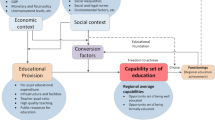Abstract
Greater equality in the distribution of incomes, both nationally and internationally, and more intervention to achieve this, both by national governments and international agencies, are identified as the key ideas in the proposed NIEO. Both ideas have provoked a reaction of new conservatism, aided by the current international recession. At least in part, the power of this reaction is the result of a failure in the educational professions and institutions to respond to the requirements of an NIEO in both domestic and global terms.
Although the independent effects of education on social change and income distribution have indeed been over-estimated, it remains true, nevertheless, that education does have social and economic effects. Within states, education might be reorganized so as to dissolve the current dichotomy between a ‘learning’ childhood/adolescence and a ‘non-learning’ adulthood. Rather, learning geared to economic activity, change and restructuring might assist both developing and industrialized states to increase incomes and adjust to the requirements of the NIEO.
On the international plane, the growth of development studies and of institutions concerned with the domestic effects of international relations and commerce should facilitate a more informed understanding of the balance between self-reliance and interdependence.
Zusammenfassung
Eine einheitlichere nationale und internationale Einkommensverteilung und mehr Intervention, um diese durch nationale Regierungen und internationale Vertretungen zu erreichen, sind als Hauptideen in der vorgeschlagenen NIEO identifiziert worden. Beide Ideen haben eine Reaktion von neuem Konservatismus hervorgerufen, der durch die gegenwärtige internationale Rezession unterstützt wird. Zumindest teilweise ist das Ausmaß dieser Reaktion auf ein Versagen in den erzieherischen Berufen und Einrichtungen zurückzuführen, den Anforderungen einer NIEO in sowohl einheimischen als auch globalen Sinne genüge zu tun.
Obwohl die einzelnen Auswirkungen der Erziehung auf soziale Veränderungen und Einkommensverteilung in der Tat überschätzt worden sind, bleibt es nichtsdestoweniger wahr, daß das Erziehungswesen soziale und ökonomische Auswirkungen hat. Innerhalb von Staaten kann das Erziehungswesen so reorganisiert werden, daß die gegenwärtige Dichotomie zwischen ‘lernender’ Kindheit/Adoleszenz und ‘nichtlernendem’ Erwachsenendasein zu beheben ist. Vielmehr kann das Lernen, das auf ökonomische Tätigkeiten, Veränderungen und Umstrukturierungen gerichtet ist, dazu beitragen, daß Entwicklungsländer und Industrieländer gleichermaßen ihr Einkommen vergrößern und sich auf die Anforderungen der NIEO einstellen.
Auf der internationalen Ebene sollte die Zunahme an Entwicklungsstudien und-einrichtungen, die sich mit einheimischen Auswirkungen internationaler Beziehungen und Handel befassen, ein fundierteres Verständnis für die Balance zwischen Eigenständigkeit und wechselseitiger Abhängigkeit erleichtern.
Résumé
Une plus grande égalité dans la répartition des revenus, tant sur le plan national qu'international, et une intervention plus active des gouvernements nationaux ainsi que des institutions internationales, sont identifiées comme les idées clefs du NIEO. Ces deux idées ont provoqué une réaction du nouveau conservatisme, étant donné la récession internationale actuelle. La force de cette réaction, du moins en partie, est due à une incapacité des professions de l'éducation et des institutions à remplir les conditions requises par le NIEO, que ce soit sur le plan intérieur ou général.
Bien que l'on ait exagéré les effets indépendants de l'éducation sur les changements sociaux et sur la répartition des revenus, il n'en reste pas moins vrai, toutefois, que l'éducation produit des effets sociaux et économiques. A l'intérieur des états, l'éducation pourrait être réorganisée de façon à faire disparaître l'actuelle dichotomie entre les enfants ou les adolescents ‘apprenants’ et les adultes ‘non apprenants’. Assurément, l'apprentissage enclanché sur l'activité, le changement et la restructuration économique, pourrait aider les états industrialisés, aussi bien que ceux en développement, à accroître leurs revenus et à s'adapter aux conditions requises par le NIEO.
Sur le plan international, la multiplication des études pour le développement et des institutions concernées par les effets intérieurs, des relations internationales et du commerce mondial devrait faciliter une compréhension mieux informée de l'équilibre entre l'autonomie et l'interdépendance.
Similar content being viewed by others
Rights and permissions
About this article
Cite this article
Emmerij, L. What does education have to do with the New International Economic Order. Int Rev Educ 28, 439–448 (1982). https://doi.org/10.1007/BF00606915
Issue Date:
DOI: https://doi.org/10.1007/BF00606915




